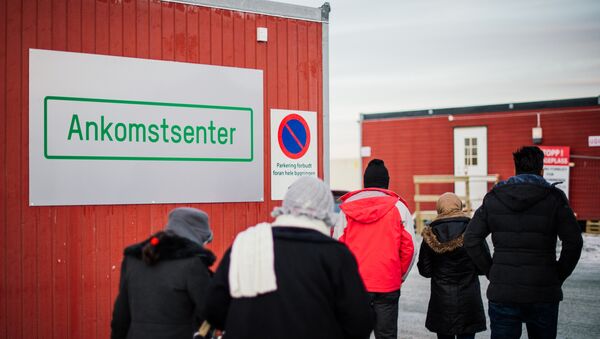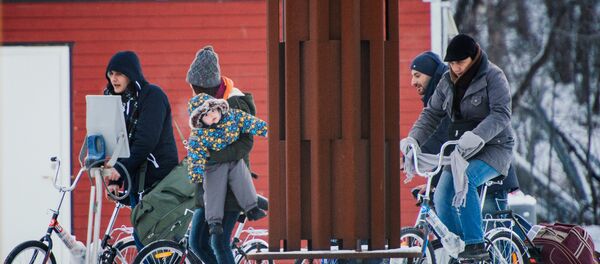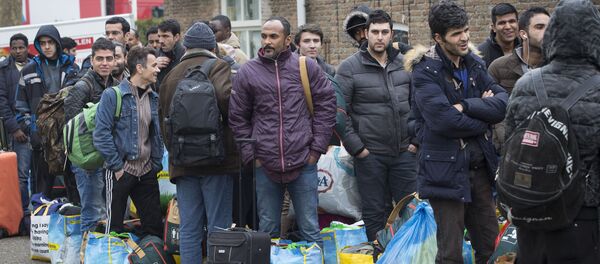KIRKENES (Norway) (Sputnik) — They refuse to believe Norway actually intends to send them back to Russia, from where they crossed into the Scandinavian country, and are making plans for the future.
Those whose applications have already been turned down and are awaiting deportation in the camp near the Russian border, complain about the inhumane living conditions and have asked the authorities to speed up the inevitable.
Norwegian Minister for Migration Sylvi Listhaug has repeatedly stated that Oslo intends to send back all 5,500 refugees. However, at the moment only 200 have been deported from the country. In early February, Russia agreed to accept up to 300 migrants who still have valid permits to stay in Russia. However, they currently remain in Norwegian camps.
In January, Russia said that temporarily stops the reception of refugees for security reasons. Later, an expert group of experts of the two countries agreed that 200-300 people will be deported, most likely, in Moscow by plane. However, while the refugees remain in camps for migrants and waiting for the decision of their fate.
Hopes and Expectations
In Norway's far north, in the village of Neiden, some 30 miles from the Russian border, a small hotel previously used by fishing enthusiasts has become a migrant camp. Now it houses nearly 100 people, including 59 children.
Asked about what they do during the day, refugees answer: "We wait." They are waiting for their asylum applications to be considered, allowing them to leave the camp, settle down, return to their profession and enroll the children in school. They are certain that Norway will take them, despite the legislation. "They have not deported us so far, no one has been recently expelled, so probably we will be able to stay here," a migrant says.
Children run about, chasing each other on scooters on the street and picking up the basics of snowball fights and football on the snow.
"All the children go to school. Just imagine, before only five students attended Neiden's school, now it is a few dozen," the director of the camp, Heidi Mathilde Olsen, says. She does not take her eyes off the kids who are vying for her attention and a kind word. Heide gives both generously and says that it is easy to find a common language with the little guests as many of them speak English while at home the teach their parents Norwegian.
Many of the camp's residents speak Russian. An elderly Syrian says that in his youth he studied in Russia, and is very fond of the country. A Palestinian woman, Fida, also lived for some time in Russia and can easily explain herself in Russian. They all consciously chose to travel to Norway and have big plans and hopes for their future life in the kingdom — to get a job, to resume a peaceful life.
Escape From War
"My children have seen war. My house repeatedly came under attack, the windows were broken, we have seen dead bodies in the streets. Don't believe what they say about the war in Syria on TV — it is much much worse in real life," Rana, another Syrian refugee, laments.
A pharmacist and a dental technician, a teacher and a nurse, a lawyer and an engineer — all the refugees living in the camp at Neiden are adamant that they do not wish to sit idly, they are ready to work and contribute to society, rather than rely on a state allowance. The authorities of the county of Finnmark in northeastern Norway are confident that they will be able to find work and housing for all those who are allowed to stay.
In Between Two Borders
The main question today is how many people will receive asylum in Norway. In the camp in the border city of Kirkenes, a few dozen refugees, who for the most part have already been turned down because they have a valid Russian visa or residence permit, are awaiting the end of the bureaucratic saga. Several times in January they found their names on the lists of those ready or deportation but at the last moment the authorities of the two countries could not agree on technical issues.
As a result, these people find themselves in limbo between the two borders. Journalists are not allowed in this camp: Norwegian officials explain that the camp has "a special status." What this status means became clear when one of the refugees living in the camp came to a public debate in Kirkenes and described conditions in the facility.
"The conditions are terrible. I have been living there for 25 days, and the camp is designed for people to stay there no more than two days. There is no water to take a shower, no money, no opportunity to go into the city, no communications, it is very cold. There are eighteen people per one room, without an means to wash clothes, we don't have warm clothes. If you want to send us back to Russia — just do it but do not force us to live in such terrible conditions," the refugee said.
The mayor of the local Sor-Varanger municipality, Rune Rafaelsen, admitted that he was shocked by the refugee's revelations. "What you have told — it's shameful. The Norwegian authorities are spending money so that refugees are provided with decent conditions. And now we learn that there is no water, it's cold, we hear about horrible conditions. Norway should not treat people like it. I'm ashamed!" the mayor said, adding that he would write about the situation to the Norwegian Directorate of Immigration.
New Blood-Fresh Ideas
Zahra Moini, the director of the Norwegian Center for Multicultural Value Creation, believes that the influx of refugees creates new possibilities, revitalizes the labor force and brings new ideas rather than creating problems.
The center has been supporting migrants who want to work in Norway or start their own business. However, employers are not always willing to hire them.
"Many Norwegians believe that the influx of refugees is a disaster for Norway, they fear it could increase unemployment, erode living standards, undermine local identity. Refugees themselves are afraid they will be forced to to the margins of society, unable to become an integral part of it," she explains, adding that the authorities should change their view on the situation.
"Many refugees want to work, they have knowledge, abilities, they are willing to move to areas where there are vacant jobs. Refuges should be considered not only as a problem, but as an important labor resource," Zahra Moini points out, adding that this man power could be efficiently used in such counties as Finnmark which are experiencing problems associated with an aging population.
According to Moini, migrants comprise 15.6 percent of the Norwegian population, or more than 800,000 people. At the moment only 3.6 percent of them are refugees, however, soon the proportion is likely to increase significantly, the center's director adds.






